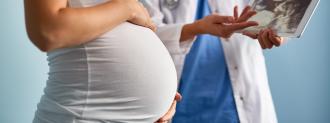Pregnant women have a lot on their minds — what to eat, is the baby healthy, how much should they exercise? Now, with coronavirus sweeping through the nation, soon-to-be-moms are looking for answers. But the virus has only been around for about six months, not long enough to draw conclusions about how it affects pregnant women with COVID-19 and their babies. Research is slim.
One thing we do know is that during pregnancy, a woman’s body changes. Blood volume and flow increases, lung capacity, and heart rate also increase. But susceptibility to respiratory illness also goes up, and pregnancy suppresses the immune system — leaving pregnant women more vulnerable to influenza, bronchitis, and possibly COVID-19.
Many studies suggest that pregnant women with COVID-19 aren’t more likely to have a severe reaction or pass on the virus to their baby. But, the jury is still out.
A study, published on June 26, suggests that pregnant women with COVID-19 are much more likely to be hospitalized than other women.
But the caveat here is crucial: the study didn’t say why they were in the hospital. Pregnant women already have perfectly normal reasons for being in the hospital, which have nothing to do with COVID-19 (notably, delivering babies).
High fevers during the first trimester have been linked to birth defects.
In addition, many hospitals have a policy of testing all pregnant women who come in for delivery, which may be contributing to the apparently high hospitalization rates: pregnant women with COVID-19 may be getting diagnosed in the hospital itself.
In the study, the researchers analyzed data reported to the CDC on COVID-19 cases for 83,205 women and 8,207 pregnant women. They found that pregnancy increased the probability that a woman would be admitted to the ICU or placed on a ventilator by less than one percentage point.
But the probability of hospitalization rose from 6% for nonpregnant women to 31% in pregnant women, all between the ages of 15 to 44 — possibly because doctors are generally more cautious with pregnant women, who they’d want to keep under observation, and possibly simply because they are there for labor and delivery.
“There’s quite clearly a different threshold for hospitalizing pregnant people and nonpregnant people,” Neel Shah, an OBGYN at Harvard University, told NYT. “The question is whether it also reflects something about their illness, and that’s something we don’t really know.”
In addition, pregnant women should always be cautious of high fevers — a common symptom of COVID-19. High temperature in pregnant women, especially during the first trimester, has been linked to birth defects.
We could look to past coronavirus pandemics for some insight into today’s novel coronavirus. A 2005 study indicates that pregnant women hospitalized with SARS stayed longer in the hospital, were more likely to end up in intensive care, and had a higher chance of experiencing complications like renal failure and sepsis.
But this isn’t a huge cause for alarm. The CDC has always maintained that pregnant women have the same level of risk for COVID-19 as other adults. After the release of the June 26 article, however, they changed their stance to say that “pregnant people might be at an increased risk for severe illness from COVID-19.” However, even with a possible increased risk, a June 12 study found that, in pregnant women with COVID-19, it is unlikely for the virus to be transmitted in the womb.
Newborns have tested positive for COVID-19, but these instances are rare, and it isn’t clear if they contracted the virus in the womb, during birth, or once they entered the world. Nearly all babies with COVID-19 recovered with mild symptoms.
“I am happy to see that the data continues to be reassuring, supporting keeping the mother/infant pair together after birth, underlining that while occasional postnatal infant infection is detected, clinical course tends to be mild,” said Jeannette Comeau, a Paediatric Infectious Diseases Physician at Dalhousie University.
The take-home message: If you are pregnant, be careful, abide by the social distancing and safety guidelines, but don’t stress — because researchers already know that stress isn’t good for pregnancy.
We’d love to hear from you! If you have a comment about this article or if you have a tip for a future Freethink story, please email us at [email protected]






